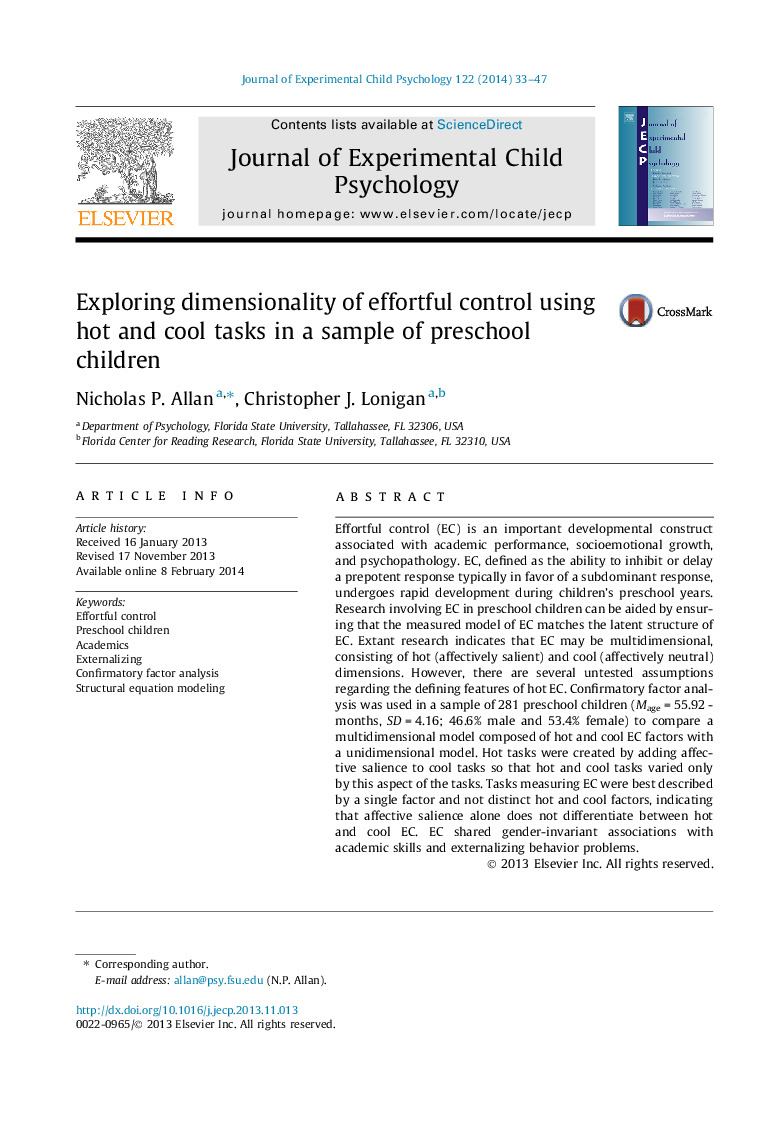| کد مقاله | کد نشریه | سال انتشار | مقاله انگلیسی | نسخه تمام متن |
|---|---|---|---|---|
| 7275564 | 1473490 | 2014 | 15 صفحه PDF | دانلود رایگان |
عنوان انگلیسی مقاله ISI
Exploring dimensionality of effortful control using hot and cool tasks in a sample of preschool children
ترجمه فارسی عنوان
بررسی ابعاد کنترل قدرتمند با استفاده از وظایف داغ و سرد در یک نمونه از کودکان پیش دبستانی
دانلود مقاله + سفارش ترجمه
دانلود مقاله ISI انگلیسی
رایگان برای ایرانیان
کلمات کلیدی
کنترل زودرس، کودکان پیش دبستانی، دانشگاهیان، خارجی تجزیه و تحلیل عامل عامل تایید، مدل سازی معادلات ساختاری،
موضوعات مرتبط
علوم انسانی و اجتماعی
روانشناسی
روانشناسی رشد و آموزشی
چکیده انگلیسی
Effortful control (EC) is an important developmental construct associated with academic performance, socioemotional growth, and psychopathology. EC, defined as the ability to inhibit or delay a prepotent response typically in favor of a subdominant response, undergoes rapid development during children's preschool years. Research involving EC in preschool children can be aided by ensuring that the measured model of EC matches the latent structure of EC. Extant research indicates that EC may be multidimensional, consisting of hot (affectively salient) and cool (affectively neutral) dimensions. However, there are several untested assumptions regarding the defining features of hot EC. Confirmatory factor analysis was used in a sample of 281 preschool children (Mage = 55.92 months, SD = 4.16; 46.6% male and 53.4% female) to compare a multidimensional model composed of hot and cool EC factors with a unidimensional model. Hot tasks were created by adding affective salience to cool tasks so that hot and cool tasks varied only by this aspect of the tasks. Tasks measuring EC were best described by a single factor and not distinct hot and cool factors, indicating that affective salience alone does not differentiate between hot and cool EC. EC shared gender-invariant associations with academic skills and externalizing behavior problems.
ناشر
Database: Elsevier - ScienceDirect (ساینس دایرکت)
Journal: Journal of Experimental Child Psychology - Volume 122, June 2014, Pages 33-47
Journal: Journal of Experimental Child Psychology - Volume 122, June 2014, Pages 33-47
نویسندگان
Nicholas P. Allan, Christopher J. Lonigan,
